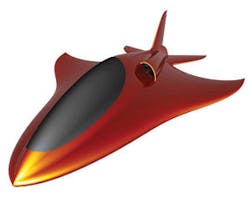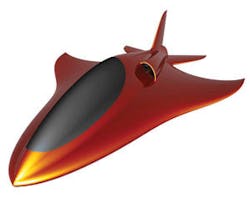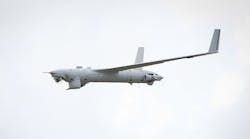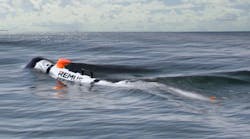By Courtney E. Howard
BERN, Switzerland - An unmanned jet powered by hydrogen fuel-cell technology, the Hyfish, has taken flight near Bern, Switzerland.
More than 18 months of cooperative development between the German Air & Space Center, called the Deutsches Zentrum fuer Luft-und Raumfahrt or DLR in Stuttgart, Germany, and its international partners, including Horizon Fuel Cell Technologies of Singapore, culminated in the maiden flight of the Hyfish.
Powering unmanned aerial vehicles (UAVs) is a challenge because these aircraft must be so small and light. Scientists at DLR Institute for Technical Thermodynamics in Stuttgart integrated Horizon Fuel Cell Technologies’s ultra-light, compact fuel-cell system into this next-generation UAV, while keeping the total system weight to 13.2 pounds.
The Hyfish fuselage is about four feet long, and its wings are about three feet wide. During the flight, the UAV performed vertical climbs, loops, and other aerial acrobatics at speeds reaching 124 miles per hour, making the Hyfish the first fast plane with jet wings to fly with a hydrogen fuel cell as its only power source, developers say.
The no-emission, polymer electrolyte fuel cell designed by Horizon’s team for the Hyfish achieves 1 kilowatt of electrical- power output and boasts a total weight, including its pressurized hydrogen tank, of 6.6 pounds.
“We are confident that record-breaking 15-to-30-hour flight times are now within reach for small UAVs, which would offer new and disruptive possibilities in the aviation industry,” says George Gu, president and CEO of Horizon Fuel Cell Technologies.
In fact, Horizon engineers anticipate delivering fuel cells to three other UAV development programs this year, company representatives say.
The Hyfish development team plans to optimize and prepare the UAV for further test flights. Partners on the project include SmartFish GmbH of Bern, Switzerland (developed the flight model); Horizon Fuel Cell Technologies in Singapore (gas-cell stack); Drukon in Spitzkunnersdorf, Germany (pressure-reducing valve), and Luxfer BaltiCo (Wasserstofftank) and Ainet (building of forms) in Germany.
Additional information and digital video of the Hyfish’s first flight are available online at www.horizonfuelcell.com/uav.




